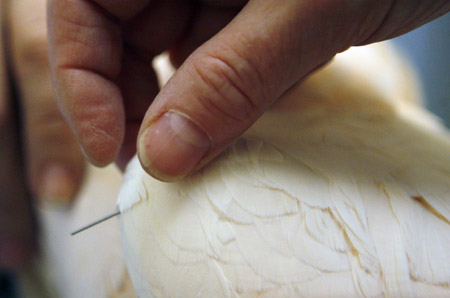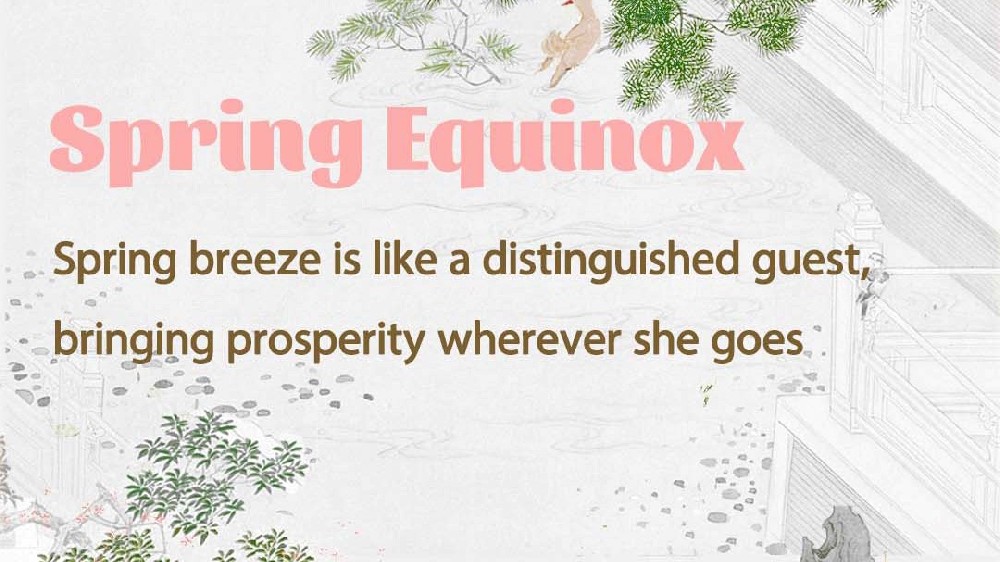Acupuncture, herbal medicine become more popular in U.S.

Doctor Lisa Moses removes an acupuncture needle from "Ashley", a Moluccan Cockatoo, at the Angell Animal Medical Center in Boston, Massachusetts
(Photo: Xinhua)
When Dr Francis Yu started his acupuncture clinic in California in the 1970s, most of his patients were Chinese. But now, half of his patients are non-Chinese.
"More non-Chinese Americans begin to accept the Chinese way of treatment, such as acupuncture, cupping and herbal medicine. Another truth is, at least in California, nearly half of those who have acupuncture licenses and operate acupuncture clinics are not Chinese but Americans who do not know Chinese," said Yu who owns his two-storied TCM Healing Institute in Arcadia in the suburbs of Los Angeles.
Dr Yu's remarks echoed the recent press reports that alternative medicine is finding wider acceptance by doctors, insurers and hospitals in the U.S.
People turn to unconventional therapies and herbal remedies for everything from hot flashes and trouble sleeping to cancer and heart disease. They crave more "care" in their health care as more people distrust drug companies and the government.
California became the first U.S. state to license qualified acupuncture practitioners as primary care providers in 1978. As of 2004, California has licensed more than 9,000 acupuncturists. Now the figure is estimated to exceed 15,000. California constitutes nearly half of the licensed acupuncturists in the U.S.
Dr Yu told Xinhua that in the early days, acupuncture was not accepted and respected by the mainstream. Most Americans did not regard acupuncture as an alternative treatment. But as time goes by and when more U.S. hospitals and research institutions set up acupuncture treatment centres, more Americans turned to Chinese acupuncture and herbal medicine to cure diseases conventional American doctors could not treat.
He said recently one American lady in her 40s came from Florida to treat her pain in the neck. But Dr Yu told her she needed to remove the plaque in her artery. She received cupping treatment several times and when she went back to Florida, her doctor told her the plaque was gone and she felt much better.
She then recommended her friend, a 47-year-woman, to see Dr Yuin in the hope she can get pregnant. Dr Yu said the treatment was going on, and he was not sure whether the lady could get pregnant at her age. But those cases show that more Americans are willing to try the Chinese way of medical treatment.
In California and other states, when a doctor has an acupuncture license, the doctor can give herbal treatment to patients. Although traditional Chinese medicine is not legal in California, doctors with acupuncture licenses can treat patients with cupping and herbal medicine.
The legal use of herbal medicine was made possible 15 years ago when the U.S. Congress decided to allow dietary and herbal supplements to be sold without Food and Drug Administration (FDA) approval. Since then the number of products soared, from about 4,000 then to well over 40,000 categories now.
The increasing acceptance of alternative treatments such as acupuncture and herbal medicine was also made possible by big healthcare insurance that cover the expenses of patients who accept the treatment of acupuncture, cupping and herbal medicine, Dr. Yu said.
Although Dr. Yu said the government regulation seemed ridiculous for doctors to have an acupuncture license first before they can practice other Chinese medicine such as cupping and herbal treatment, it legalizes the practice of acupuncture and other ways to treat patients in the Chinese way in the U.S.
Increasing numbers of big hospitals and institutions, including Johns Hopkins Hospital and the R Adams Cowley Shock Trauma Center at the University of Maryland Medical Center, have established integrative medicine units that bring together conventional and alternative approaches to care.
The alternative treatment includes stress reducers like meditation, yoga and massage besides acupuncture and cupping.
Studies show that the number of Americans willing to try alternative treatments continues to increase. A 2007 survey by the federal government found that more than one-third of adults and nearly 12 per cent of children in the U.S. used alternative therapies, including acupuncture, chiropractic, homoeopathy and herbal supplements.
But many mainstream physicians continue to be sceptical of alternative therapies, alleging their efficacy has not been proven and their successes may be nothing more than variations of the placebo effect.
Concerns over the effectiveness and safety of herbal supplements have prompted the U.S. FDA to issue its first guidelines for good manufacturing practices to improve supplement safety.
The U.S. Federal Trade Commission is also filing more complaints about deceptive marketing in herbal supplements.
Related articles
-
 Kernels of TCM wisdom - NUTS for nutrition
Kernels of TCM wisdom - NUTS for nutritionMore
-
 3 Tips for healthier heart with traditional Chinese medicine
3 Tips for healthier heart with traditional Chinese medicineMore
-
 Traditional Chinese medicine becomes popular with Ghanaians
Traditional Chinese medicine becomes popular with GhanaiansMore
-
 Smiley-face TCM - Don't worry, be happy
Smiley-face TCM - Don't worry, be happyMore
-
 The traditional Chinese medicine approach to digestive health
The traditional Chinese medicine approach to digestive healthMore
-
 Mushrooms a super energy booster and sickness fighter
Mushrooms a super energy booster and sickness fighterMore
